The Air Force Common Admission Test (AFCAT) Examination is conducted twice a year by the Indian Air Force to select male and female candidates for Flying and Ground Duty (Technical & Non-Technical) branches of Indian Air Force. AFCAT written exam consists of a paper containing four sections: Numerical Ability, English, Reasoning & Military Aptitude and General Awareness.
English (Verbal Ability) Part is an important section of the AFCAT examination. Below is a list of 300 most commonly asked questions that you can expect for your upcoming AFACT examination, as per the last five years’ AFCAT exam trend.
English Section in AFCAT exam includes 25 questions and a total of 75 marks with 3 marks being awarded for each correct answer and 1 mark deducted for each incorrect one. The total paper duration is of 2 hours.
ALSO READ:
- 300 Most Expected Questions For AFCAT Reasoning Section
- 300 Most Expected Questions For AFCAT Numerical Ability Section
- 300 Most Expected Questions For AFCAT Static GK Section
AFCAT English Syllabus consists of :
- Spotting of Errors
- Antonyms
- Synonyms
- Vocabulary (Idioms & Phrases)
- Sentence Completion (Fill in the Blanks & Cloze Test)
- Ordering of Words & Sentences
- Comprehension
- One Word Substitution
- Spelling
Most Important Topics to Focus On:
- Antonyms
- Synonyms
- Vocabulary (Idioms & Phrases)
- Sentence Completion (Fill in the Blanks & Cloze Test)
- Comprehension
- Spelling
Below is the list of 300 most expected questions in the English section topic-wise as per the previous years’ Q&A analysis.
Part 1
Antonyms:
| 1 | MONOLOGUE (a) Prologue (b) Epilogue (c) Dialogue (d) Catalogue Ans. (c) |
| 2 | SANCTIMONIOUS (a) Holy (b) Realistic (c) Humble (d) Callous Ans. (c) |
| 3 | DELETE (a) Imbibe (b) Improve (c) Insert (d) Inspire Ans. (c) |
| 4 | MUNIFICENT (a) Miserly (b) Faulty (c) Perplexing (d) Rudimentary Ans. (a) |
| 5 | AMBIGUITY (a) Certainty (b) Clarity (c) Rationality (d) Laxity Ans. (b) |
| 6 | OPAQUE (a) Vague (b) Firm (c) Transparent (d) Poor Ans. (c) |
| 7 | HYSTERIA (a) Disease (b) Ceremony (c) Serenity (d) Frenzy Ans. (c) |
| 8 | RESTIVE (a) Unrestrained (b) Communicate (c) Peaceful (d) Quarrel Ans. (c) |
| 9 | ABSTAIN (a) Indulge (b) Dismiss (c) Repel (d) Acquire Ans. (a) |
| 10 | CATAPULT (a) Reach great heights (b) Downfall (c) Caterpillar (d) Gaining Ans. (b) |
| 11 | SEDENTARY (a) Inactive (b) Sluggish (c) Moving (d) Settled Ans. (c) |
| 12 | HAMPERED (a) Facilitated (b) Prompted (c) Relieved (d) Instigated Ans. (a) |
| 13 | PROFUSION (a) Travesty (b) Validity (c) Scarcity (d) Agitated Ans. (c) |
| 14 | IRREMEDIABLE (a) That which can be avoided (b) Incurable (c) Profitable (d) That which can be corrected Ans. (d) |
| 15 | CAJOLE (a) Nestle (b) Secede (c) Bully (d) Moisten Ans. (c) |
| 16 | ACQUIT (a) Inform (b) Release (c) Abuse (d) Condemn Ans. (d) |
| 17 | INSOLENT (a) Affable (b) Spotted (c) Foolish (d) Mature Ans. (a) |
| 18 | LEISURELY (a) Idly (b) Lazily (c) Foolishly (d) Hurriedly Ans. (d) |
| 19 | DEROGATORY (a) Conferred (b) Immediate (c) Praising (d) Private Ans. (c) |
| 20 | UNGAINLY (a) Quick (b) Short (c) Awkward (d) Graceful Ans. (d) |
| 21 | WANE (a) Widen (b) Poor (c) Swell (d) Tight Ans. (c) |
| 22 | MALICE (a) Rancor (b) Enmity (c) Pitiable (d) Goodwill Ans. (d) |
| 23 | PREDILECTION (a) Oblivion (b) Objectivity (c) Aversion (d) Defeat Ans. (c) |
| 24 | MELANCHOLY (a) Cheerfulness (b) Depressed (c) Doleful (d) Reckless Ans. (a) |
| 25 | CACOPHONOUS (a) Tamed (b) Harmonious (c) Domestic (d) Silent Ans. (d) |
| 26 | MERCENARY (a) Calm (b) Generous (c) Venal (d) Wanton Ans. (b) |
| 27 | HAUGHTINESS (a) Affability (b) Unskilled (c) Adduce (d) Abject Ans. (d) |
| 28 | METICULOUS (a) Finicky (b) Thankful (c) Lavish (d) Careless Ans. (d) |
| 29 | INEQUITY (a) Law (b) Illegal (c) Slander (d) Libel Ans. (a) |
| 30 | MODEST (a) Unassuming (b) Curious (c) Retiring (d) Bold Ans. (d) |
Synonyms:
| 31 | PRAGMATIC (a) Theoretical (b) Suitable (c) Realistic (d) Productive Ans. (c) |
| 32 | INFAMY (a) Notoriety (b) Glory (c) Integrity (d) Familiarity Ans. (a) |
| 33 | PRISTINE (a) Fresh (b) Old (c) Preserve (d) Dirty Ans. (a) |
| 34 | COLOSSUS (a) Tall (b) Huge (c) Lofty (d) Towering Ans. (b) |
| 35 | SPORADIC (a) Epidemic (b) Whirling (c) Occasional (d) Stagnant Ans. (c) |
| 36 | CREDIBLE (a) Worthy (b) Believable (c) Noticeable (d) Careful Ans. (b) |
| 37 | GENESIS (a) Style (b) Beginning (c) Movement (d) Relevant Ans. (b) |
| 38 | SQUANDER (a) Use economically (b) Spend wastefully (c) Siphon judiciously (d) Donate generously Ans. (b) |
| 39 | INTIMIDATE (a) Mislead (b) Misplace (c) Frighten (d) Demoralise Ans. (c) |
| 40 | PARADOX (a) Similarity (b) Position (c) Anomaly (d) Difference Ans. (c) |
| 41 | ANATHEMA (a) Religious Chant (b) Pun (c) Musical Subject (d) Curse Ans. (d) |
| 42 | EMANCIPATE (a) Pass (b) Confuse (c) Free (d) Imagine Ans. (c) |
| 43 | DEBILITATE (a) Weaken (b) Attack (c) Surmount (d) Destroy Ans. (a) |
| 44 | INTRINSICALLY (a) Internally (b) Whole-heartedly (c) Fundamentally (d) Virtually Ans. (c) |
| 45 | PENCHANT (a) Liking (b) Eagerness (c) Disability (d) Keenness Ans. (a) |
| 46 | LURID (a) Happy (b) Abundant (c) Bright (d) Shocking Ans. (d) |
| 47 | PREPOSTEROUS (a) Formal (b) Judicious (c) Ridiculous (d) Ceremonious Ans. (c) |
| 48 | ODIOUS (a) Hateful (b) Rotten (c) Infamous (d) Sick Ans. (a) |
| 49 | DISSEMBLE (a) Disagree (b) Shake (c) Impeccable (d) Conceal Ans. (d) |
| 50 | GULLIBILITY (a) Shrewdness (b) Simplicity (c) Avidity (d) Gravity Ans. (b) |
| 51 | RAUCOUS (a) Flavourful (b) Jarring (c) Boisterous (d) Evil Ans. (c) |
| 52 | ABJURE (a) Renounce (b) Announce (c) Pronounce (d) Denounce Ans. (d) |
| 53 | ABROGATE (a) Put an end to (b) Elope (c) Gatecrash (d) Send away Ans. (a) |
| 54 | CANTANKEROUS (a) Noisy (b) Quarrelsome (c) Rash (d) Disrespectful Ans. (b) |
| 55 | IDIOCY (a) Madness (b) Happiness (c) Wisdom (d) Repentance Ans. (a) |
| 56 | GALL (a) Macho (b) Bold (c) Boastful (d) Audacity Ans. (b) |
| 57 | HARBINGER (a) Remarkable (b) Omen (c) Meritorious (d) Overwhelming Ans. (b) |
| 58 | MONOTONOUS (a) Dreary (b) Dreadful (c) Single-minded (d) Monologue Ans. (a) |
| 59 | PASSE (a) Out of date (b) Forthcoming (c) Fashionable (d) Predictable Ans. (a) |
| 60 | VORACIOUS (a) Very bad (b) Insatiable (c) Stingy (d) Malicious Ans. (b) |
Part 2
Idioms & Phrases:
| 61 | To read between the lines (a) To suspect (b) To read carefully (c) To understand the hidden meaning of the word (d) To do useless things Ans. (c) |
| 62 | A Curtain Lecture (a) To speak plainly (b) Vulgar ideas (c) Private scolding of a husband by his wife (d) Hate others Ans. (c) |
| 63 | To face the music (a) To prepare to give a musical performance (b) To suffer evil consequences (c) To suffer hardships (d) To change the things Ans. (b) |
| 64 | Square pegs in round holes (a) A genuinely helpful person (b) A clever person (c) People in the wrong jobs (d) To be perplexed Ans. (c) |
| 65 | To leave no stone unturned (a) To keep clean and tidy (b) To try utmost (c) To work enthusiastically (d) To change the things Ans. (b) |
| 66 | In weal and woe (a) By hook or crook (b) During illness (c) In prosperity and adversity (d) During the operation Ans. (c) |
| 67 | Between the devil and the deep sea (a) A deep sea diver (b) To be evil tempered (c) In a dilemma (d) A man who is drowning Ans. (c) |
| 68 | Upto the hilt (a) Completely (b) Upto the mark (c) Upto the final decision (d) None of these Ans. (a) |
| 69 | To fight tooth and nail (a) To fight a losing battle (b) To fight heroically (c) To make every possible effort to win (d) To fight cowardly Ans. (c) |
| 70 | Man of Letters (a) Who writes too many letters (b) An important person (c) A politician (d) A literary person Ans. (d) |
| 71 | To flog a dead horse (a) To revive interest in a subject which is out of date (b) To beat a horse that is dead (c) To do interesting things (d) To try to take work from a weak horse Ans. (a) |
| 72 | To go like a bomb (a) Loud explosion (b) To move fast (c) Terrorism (d) Not practical Ans. (b) |
| 73 | To meet one’s waterloo (a) To meet a strong adversary (b) To meet with humiliation (c) To die fighting (d) To meet one’s final defeat Ans. (d) |
| 74 | Bolt from the blue (a) Unexpected (b) Lighting (c) Nervous (d) Sudden Ans. (d) |
| 75 | Through thick and thin (a) Big and small (b) Large object (c) Under all conditions (d) Thin and fat Ans. (c) |
| 76 | Be given the axe (a) To move fast (b) Carpenter (c) Woodcutter (d) To lose job Ans. (d) |
| 77 | Sitting on the fence (a) Unbalanced (b) Uncomfortable (c) Coward (d) Between two opinions Ans. (d) |
| 78 | Split one’s side (a) Intense pain (b) To laugh a lot (c) To be hurt (d) None of these Ans. (b) |
| 79 | An axe to grind (a) Difficult job (b) Hard labour (c) Private ends to serve (d) Punishment Ans. (c) |
| 80 | Building castles in the air (a) Making impossible plans (b) Making tall promises (c) Building skyscrapers (d) Structures without strong foundation Ans. (a) |
| 81 | A hard nut to crack (a) Difficult things require extra effort (b) A difficult problem to solve (c) A difficult problem solved effortlessly (d) Costly things need careful handling Ans. (b) |
| 82 | At the drop of a hat (a) Willingly and softly (b) Willingly and immediately (c) Willingly and silently (d) Slowly and silently Ans. (b) |
| 83 | From hand to mouth (a) Something repeated often (b) Consuming food (c) To survive without saving (d) Hitting someone by hand on the mouth Ans. (c) |
| 84 | Rain cats and dogs (a) Rain heavily (b) To fight in rain (c) Cats and dogs fight (d) Rain water wastage Ans. (a) |
| 85 | To beat about the bush (a) Not to come to the point (b) Vigorous search for the culprit (c) Easily achieved success without much effort (d) Working hard to achieve the goal Ans. (a) |
| 86 | At daggers drawn (a) To throw daggers (b) To be bitterly hostile (c) To be confused (d) To think deeply Ans. (b) |
| 87 | To burn one’s fingers (a) To get injured in an accident (b) To pay a heavy price (c) To suffer from meddling in something (d) To get a burn injury on the hands Ans. (c) |
| 88 | To bury the hatchet (a) To make peace with the enemy (b) To throw soil over something (c) To make someone cry (d) To kill someone Ans. (a) |
| 89 | To run riot (a) Befool other (b) Be violent in action (c) Criticise other (d) Behave in an undisciplined way Ans. (d) |
| 90 | At the eleventh hour (a) too late (b) too early (c) immediately (d) at the last moment Ans. (d) |
Fill in the Blanks:
| 91 | He will impart no information ……… anyone. (a) from (b) for (c) with (d) to Ans. (d) |
| 92 | According to the weather __________ it is going to be cloudy today. (a) announcement (b) indication (c) prediction (d) forecast Ans. (d) |
| 93 | Jyoti refused to be ……… by her long illness. (a) dispatched (b) dispirited (c) dispersed (d) dispensed Ans. (b) |
| 94 | The villagers __________ the murder of their leader by burning the police van. (a) protested (b) avenged (c) mourned (d) consoled Ans. (b) |
| 95 | He was ……… by nature and so avoided all company. (a) cordial (b) anti-social (c) gregarious (d) timid Ans. (d) |
| 96 | The unruly behaviour of the soldiers ___________ their commander. (a) clashed (b) aggrieved (c) incensed (d) impeached Ans. (c) |
| 97 | Jim suffered a ……… of fortune. (a) regress (b) revert (c) reversal (d) reverse Ans. (c) |
| 98 | The judge decided to resign when he was _______ for promotion to Chief Justice. (a) passed by (b) passed out (c) passed off (d) passed over Ans. (d) |
| 99 | The United Kingdom ……… England, Wales, Scotland and Northern Ireland. (a) comprises (b) comprise (c) combines (d) consists Ans. (a) |
| 100 | Questions will be answered by a _______ of experts. (a) staff (b) panel (c) bunch (d) band Ans. (b) |
| 101 | If you do well in this exam next year, then my efforts ……… successful. (a) will be (b) would have been (c) has been (d) have been Ans. (a) |
| 102 | Sanjay was______________ with divine vision to see the great battle. (a) demure (b) authorized (c) endowed (d) uttered Ans. (c) |
| 103 | Masked men ……… a security van on the motor way. (a) held up (b) held out (c) held on (d) held forth Ans. (a) |
| 104 | The world is so constructed that if you wish to enjoy its pleasures, you must also______ its pains. (a) deny (b) neglect (c) ignore (d) endure Ans. (d) |
| 105 | The noise of the drum beats………and frightened the tiger. (a) pertained (b) perplexed (c) persisted (d) prevented Ans. (b) |
| 106 | Mohini is an independent and innovative thinker, it is best to grant her a good deal of __________ with regard to the direction of her research. (a) leverage (b) interest (c) assistance (d) money Ans. (a) |
| 107 | He set up institutions of international ……… . (a) famous (b) renown (c) repute (d) reputation Ans. (c) |
| 108 | Due to the rise of new media technology, many people predict newspapers will soon be __________ . (a) obsolete (b) ubiquitous (c) commonplace (d) widespread Ans. (a) |
| 109 | We ……… not hurry, we have got plenty of time. (a) would (b) need (c) must (d) should Ans. (b) |
| 110 | Although the two sisters are twins, they look somewhat __________. (a) alike (b) unique (c) different (d) related Ans. (c) |
| 111 | The rank and ……… of the party had turned against the leader. (a) file (b) class (c) officers (d) people Ans. (a) |
| 112 | The Government will ______ all resources to fight poverty. (a) collect (b) exploit (c) harness (d) muster Ans. (c) |
| 113 | After being caught in the act, Rajneesh knew that he was in ……… trouble. (a) intense (b) dreaded (c) terrible (d) dire Ans. (d) |
| 114 | The children ______ crackers to celebrate the victory of their team. (a) burst (b) fired (c) shot (d) released Ans. (a) |
| 115 | Zairian health officials said that 93 people have died ……… the Ebola virus so far. (a) of (b) for (c) from (d) on Ans. (c) |
| 116 | I am ______ forward to our picnic scheduled in the next month. (a) seeing (b) looking (c) planning (d) thinking Ans. (b) |
| 117 | Owing to their unruly behaviours, some members of the cricket team were ……… . (a) excluded (b) exempted (c) banned (d) outlawed Ans. (a) |
| 118 | Lost time is _______ again, and what we call time enough always proves little enough. (a) found never (b) find never (c) never found (d) never been found Ans. (c) |
| 119 | It is not the right ……… to ask for my help; I am far too busy even to listen to you. (a) opportunity (b) situation (c) circumstance (d) moment Ans. (d) |
| 120 | There were four instances when Delhi Police gave short shrift to the laws of the land and, indeed, to the very Constitution they are …………. to uphold. (a) Swear (b) Sworn (c) Sword (d) Firm Ans. (b) |
Part 3
Spotting of Errors:
| 121 | The oxygen content of Mars is not (a)/ sufficient enough to support life (b)/as we know it. (c)/No error (d) Ans. (b) |
| 122 | The average age at which (A)/ people die of heart diseases (B)/ are decreasing. (C)/ No error (D) (a) A (b) B (c) C (d) D Ans. (a) |
| 123 | He told his friends that (a)/ each of them (b)/should be able to carry out the orders oneself. (c)/ No error (d) Ans. (c) |
| 124 | The last Mughal emperor was (A)/ send into exile (B)/ by the British. (C)/ No error (D) (a) A (b) B (c) C (d) D Ans. (b) |
| 125 | The Chairman made it clear at the meeting (a)/ that he will not step down (b)/from his position as chairman. (c)/No error (d) Ans. (b) |
| 126 | (a) We shan’t (b) invite them. (c) Won’t we? (d) No error Ans. (c) |
| 127 | We had (a)/lot of difficulty (b)/in finding the way here. (c)/No error (d) Ans. (b) |
| 128 | The Allahabad High Court on Monday dismissed a plea from private power producers seeking relieve from (A)/ an RBI diktat to banks to take cognizance of a stressed loan (B)/ if repayments were missed even by a day. (C)/ No error (D) (a) A (b) B (c) C (d) D Ans. (a) |
| 129 | Part of the research programme (a)/involved interviewing teenagers (b)/in inner city areas. (c)/No error (d) Ans. (c) |
| 130 | He is (A)/ one of those students (B)/ who comes late regularly. (C)/ No error (D) (a) A (b) B (c) C (d) D Ans. (c) |
| 131 | I could not put up at a hotel (a)/because the board and lodging charges (b)/were too expensive. (c)/ No error (d) Ans. (b) |
| 132 | This child (A)/ was run over (B)/ with a private bus. (C)/ No error (D) (a) A (b) B (c) C (d) D Ans. (c) |
| 133 | For a long time (a)/ I did not know who was sitting besides me (b)/ because it was so dark. (c)/ No error (d) Ans. (b) |
| 134 | The police has (a)/ arrested the thief (b)/ who broke into my house (c)/ last night. (d) Ans. (a) |
| 135 | Rabindranath Tagore was not (a)/the first Nobel Laureate (b)/ without a university degree. (c)/ No error (d) Ans. (d) |
| 136 | I may spend (a)/ this summer vacations (b)/ with one of my friends (c)/ in the back waters of Kerala. (d) Ans. (b) |
| 137 | I have just come (a)/to know that Mr. Ray, one of my favourite (b)/teachers, died with cancer recently. (c)/No error (d) Ans. (c) |
| 138 | The boss was irritated (a)/ by him neglecting (b)/ the duties and (c)/ not listening to his advice. (d) Ans. (b) |
| 139 | Many persons must have read (a)/ ‘the Arabian Nights’ (b)/ which is very interesting. (c)/No error (d) Ans. (d) |
| 140 | Each of the three (a)/ beggars were (b)/ asking for more (c)/ food to eat. (d) Ans. (b) |
| 141 | We should make green vegetables (a)/an essential part of our daily diet (b)/shouldn’t we? (c)/No error (d) Ans. (d) |
| 142 | My brother sent (a)/ two pairs (b)/ of shoe (c)/ from America. (d) Ans. (c) |
| 143 | Just as he was driving along the road, (a)/ a bus pulled up and the driver asked him (b)/if he has seen a briefcase on the road. (c)/No error (d) Ans. (c) |
| 144 | The young boy said (a)/ that he (b)/ neither liked me (c)/ nor my wife. (d) Ans. (c) |
| 145 | Experience has taught me (a)/ not to ignore any man, high or low, (b)/not to ignore anything, great or small. (c)/ No error (d) Ans. (c) |
| 146 | He was (a)/ congratulated for (b)/ his success in (c)/ the 100 m race. (d) Ans. (b) |
| 147 | I have spent (a)/most of my money, (b)/ so I can travel only by bus. (c)/ No error (d) Ans. (b) |
| 148 | The municipality is going (a)/ to built a new school (b)/ near the park. (c)/ No error (d) Ans. (b) |
| 149 | Being occupied with important matters he had (a)/ no leisure to see (b)/ us. (c)/ No error (d) Ans. (d) |
| 150 | He went to office (a)/ but returned back (b)/ home immediately. (c)/ No error (d) Ans. (b) |
Cloze Test:
| For the rule of law to be well …..151…….. and enforced, we need to start at the very beginning — mobilising our local communities. A strong, mobilized, civil society is a necessary condition to hold the State to account. It is not about one seemingly revolutionary protest, even if the well-meaning antagonists of the CAA ……152……. believe so. When violence and lawlessness spill over into the streets and begin to constrain our work-a-day lives, as it has across India; when the police are routinely challenged by those on the wrong side of the …..153…..; when the police force is overworked and overwhelmed by political subterfuge, our society will be on the brink. As a society, we are currently engaged in a negative-sum game. The rule of law cannot, unlike riots, be engineered. It can only be practiced if we understand that liberty has to be balanced with equality; and pluralism entails a measure of negative liberty. | |
| 151 | (a) Establish (b) Establishing (c) Established (d) None of these Ans. (c) |
| 152 | (a) genuine (b) genuinely (c) wrong (d) right Ans. (b) |
| 153 | (a) face (b) Law (c) Police (d) None of these Ans. (b) |
| The …(154)… age is the age of machines. From the …(155)… the Industrial Revolution began in Europe. Man’s life has been changing …(156)… many ways. At first the change was …(157)…. . Now machines have become …(158)… of our daily lives. | |
| 154 | (a) modern (b) new (c) civilised (d) present Ans. (a) |
| 155 | (a) birth (b) time (c) beginning (d) start Ans. (b) |
| 156 | (a) into (b) to (c) in (d) with Ans. (c) |
| 157 | (a) slow (b) steady (c) fast (d) stagnant Ans. (a) |
| 158 | (a) component (b) part (c) necessity (d) support Ans. (b) |
| Some scholars, while exploring the forests of America, discovered some buildings that were in ruins. These buildings were _____(159)_____ ruined by encroaching forest. They were remnants of a _____(160)_____ civilization. The scholars got interested. They excavated more and discovered _______(161)_______ their utmost surprise the remains of a flourishing civilization – the Mayas as they named it. | |
| 159 | (a) reasonably (b) surely (c) apparently (d) perfectly Ans. (c) |
| 160 | (a) great (b) invisible (c) static (d) ordinary Ans. (a) |
| 161 | (a) at (b) for (c) by (d) to Ans. (d) |
| In tropical countries, certain crops are grown ____(162)____ the year. These countries have _____(163)_____ rainfall for the crops. They also have plenty of sunshine what ______(164)______ the crops. More food than is _____(165)_____ can be grown in these places. But there are other countries in the world where it is ______(166)______ to grow crops. | |
| 162 | (a) Along (b) Over (c) Through out (d) Across Ans. (c) |
| 163 | (a) Sufficient (b) Little (c) Plenty (d) Inadequate Ans. (a) |
| 164 | (a) Opens (b) Gathers (c) Destroys (d) Ripens Ans. (d) |
| 165 | (a) Cooked (b) Required (c) Planted (d) Used Ans. (b) |
| 166 | (a) Difficult (b) Rough (c) Smooth (d) Impossible Ans. (a) |
| At the time the White House was as serene as a resort hotel out of season. The corridors were …(167)… in the various offices. …(168)… gray men on waistcoats talked to one another in low-pitched voices. The only colour or choler, curiously enough, was provided by President Eisenhower himself. Apparently, his …(169)… was easily set off; he scowled when he …(170)… the corridors. | |
| 167 | (a) striking (b) hollow (c) empty (d) white Ans. (c) |
| 168 | (a) Quiet (b) Faded (c) Loud (d) Stentorian Ans. (a) |
| 169 | (a) laughter (b) curiosity (c) humour (d) temper Ans. (d) |
| 170 | (a) paced (b) strolled (c) stormed (d) prowled Ans. (a) |
| About sixty percent of the human body is water. If you could (171) out a human being like a (172). you would obtain about fifty litres of water. This water which is not like (173) water because of the substance it (174) is necessary to the life of the human being. About a gallon of it is in the blood vessels and is (175) circulating by temperature. | |
| 171 | (a) work (b) wrench (c) press (d) squeeze Ans. (d) |
| 172 | (a) mango (b) lemon (c) fruit (d) banana Ans. (b) |
| 173 | (a) usual (b) ordinary (c) common (d) normal Ans. (d) |
| 174 | (a) dissolves (b) carries (c) contains (d) includes Ans. (c) |
| 175 | (a) continued (b) made (c) got (d) kept Ans. (d) |
| Between the year 1946 and the year 1955, I did not file any income tax returns.” With that …(176)… statement, Ramesh embarked on an account of his encounter with the Income Tax Department. “I originally owed Rs. 20000 in unpaid taxes. With …(177)… and …(178)…, the 20000 became 60000. The Income Tax Department then went into action, and I learned first hand, just how much power the Tax Department wields. Royalties and trust funds can be …(179)… automobiles may be ..(180)…, and auctioned off. | |
| 176 | (a) devious (b) blunt (c) tactful (d) pretentious Ans. (b) |
| 177 | (a) interest (b) taxes (c) principal (d) returns Ans. (a) |
| 178 | (a) sanctions (b) refunds (c) fees (d) fines Ans. (d) |
| 179 | (a) closed (b) detached (c) attached (d) impounded Ans. (c) |
| 180 | (a) smashed (b) seized (c) dismantled (d) frozen Ans. (b) |
Part 4
Comprehension:
| My brother, David, was always close to our grandmother. Both of them shared a love of Mother Nature and of food that they had grown themselves. Whenever his schedule permitted, he would drop in for a short visit and a cup of coffee. One day, when he found no one home, he left a chunk of dirt on her porch. This started what was later to be known as his “calling card”. Grandmother would come home occasionally and instantly know that Dave had been by when she spotted the chunk of dirt on her porch. Although Grandmother had a poor upbringing in Italy, she managed to do well in the United States. She was always healthy and independent and enjoyed a fulfilling life. Recently she had a stroke and died. Everyone was saddened by her death. David was disconsolate. His life-long friend was now gone. | |
| 181 | Which of the following is the synonym of the word ‘upbringing’? (a) Devastated (b) Hilarious (c) raising (d) surrounding Ans. (c) |
| 182 | The adjective form of the word ‘saddened’ is– (a) sadly (b) sad (c) suddenly (d) sudden Ans. (b) |
| 183 | What was condition of grandmother earlier? (a) rich in Italy but poor in the United States (b) in the United States but is now in Italy (c) poor earlier but became rich later on (d) rich earlier but now poor Ans. (c) |
| 184 | Grandmother enjoyed a _____ life. (a) healthy but sickly (b) good and healthy (c) rich but sickly (d) poor and healthy Ans. (b) |
| 185 | Grandmother’s death made everyone (a) sad including David (b) disconsolate excluding David (c) happy and disconsolate (d) sad excluding David Ans. (a) |
| A pioneering scheme has been started recently in Southampton on England’s south coast to educate motorists who have been convicted of drunken driving. The penalty for drunken driving might be the loss of a driving licence and a heavy fine. But under the new scheme, convicted drivers do not pay the fine. Instead they have to attend eight training sessions—one a week organized by the local authority probation service. Designed to demonstrate the damage alcohol can do, the scheme was devised by senior probation officer John Cook. He said about a quarter of the people who came to him had a drink problem, but had not realized how much they were drinking. One way of getting the message across was to make the drivers pour out their usual ration of alcohol and then measure it. Almost everyone pours out not a single measure but a double at least an example of how easy it is to have more than just one drink and to encourage other people to do the same. The instructors on the course are giving clinical evidence of the effects of alcohol on the body and brain. The sober truth is that drinking badly affects driving skills, although the drinker might like to believe otherwise. | |
| 186 | The Southampton scheme requires convicted drivers (a) to pay a heavy fine (b) to attend eight driving sessions–one a week (c) to undergo a probation service (d) to surrender their driving licence Ans. (b) |
| 187 | John Cook devised the scheme (a) as a demonstration technique for driving (b) to demonstrate the harmful effects of alcohol (c) to show that Southampton was concerned about drivers (d) to prove that alcohol does influence driving Ans. (d) |
| 188 | The problem with a quarter of the people who went to John Cook was that they (a) did not want to stop drinking (b) were unaware of the fact that they could get drunk (c) would not admit that they had a drinking problem (d) did not know how much they were drinking Ans. (d) |
| 189 | Most drivers start off with at least (a) a double measure (b) a single measure (c) a little less than a single measure (d) two doubles Ans. (a) |
| 190 | The truth is that alcohol (a) does not affect the body but only the brain (b) affects only the brain (c) affects the body and the brain (d) has no effect on the body or the brain Ans. (c) |
| In the world we have made health an end in itself? We have forgotten that health is really a means to enable a person to do his work and to do it well. A lot of modern medicine is concerned with promotion of good health. Many patients as well as many physicians pay very little attention to health; but very much attention to health makes some people imagine that they are ill. Our great concern with health is shown by the medical columns in newspaper, the health articles in popular magazines and the popularity of the Television programme and all those books on medicine we talk about health all the time. Yet for the most only result is more people with imaginary illnesses. The healthy man should not be wasting any time talking about health, he should be using health for work, the work he does and the work that good health makes possible. | |
| 191 | Modern medicine is primarily concerned with: (a) promotion of good health (b) people suffering from imaginary illnesses (c) people suffering from real illnesses (d) increased efficiency in work Ans. (a) |
| 192 | A healthy man should be concerned with: (a) his work which good health makes possible (b) looking after his health (c) his health which makes work possible (d) talking about health Ans. (c) |
| 193 | Our great concern with health is shown by? (a) free medicine distribution in hospitals (b) free education to medical students (c) taking yoga classes (d) the health articles in popular magazines Ans. (d) |
| To avoid the various foolish opinions to which mankind are prone, no superhuman brain is required. A few simple rules will keep you free, not from all errors, but from silly errors. If the matter is one that can be settled by observation, make the observation yourself. Aristotle could have avoided the mistake of thinking that women have fewer teeth than men, by the simple device of asking Mrs. Aristotle to keep her mouth open while he counted. Thinking that you know when in fact you do not, is a bad mistake, to which we are all prone. I believe myself that hedgehogs eat black beetles, because I have been told that they do; but if I were writing a book on the habits of hedgehogs, I should not commit myself until I had seen one enjoying this diet. Aristotle, however, was less cautious. Ancient and medieval writers knew all about unicorns and salamanders; not one of them thought it necessary to avoid dogmatic statements about them because he had never seen one of them. | |
| 194 | The author portrays mankind as (a) superhuman (b) by and large ignorant (c) intelligent (d) ancient Ans. (b) |
| 195 | According to the author, unicorns and salamanders (a) have existed in the past (b) are invisible (c) caused writers to write strange stories. (d) never really existed Ans. (d) |
| 196 | The author implies that (a) he has never seen hedgehogs eating beetles (b) hedgehogs eat only black beetles (c) they do not eat black beetles (d) he is writing a book on hedgehogs. Ans. (a) |
| 197 | The author is in favour of drawing conclusions on the basis of (a) discussion (b) consultation (c) observation (d) reasoning Ans. (c) |
| We stand poised precariously and challengingly on the razor’s edge of destiny. We are now at the mercy of atom bombs and the like which would destroy us completely if we fail to control them wisely. And wisdom in this crisis means sensitiveness to the basic values of life; it means a vivid realization that we are literally living in one world where we must either swim together or sink together. We cannot afford to tamper with man’s single minded loyalty to peace and international understanding. Anyone, who does it is a traitor not only to man’s past and present, but also to his future, because he is mortgaging the destiny of unborn generations. | |
| 198 | From the tone and style of the passage it appears that the writer is (a) a prose writer with a fascination for images and metaphors. (b) a humanist with a clear foresight. (c) a traitor who wishes to mortgage the destiny of future generations. (d) unaware of the global power situation. Ans. (b) |
| 199 | The best way to escape complete annihilation in an atomic war is to (a) work for international understanding and harmony. (b) invent more powerful weapons. (c) turn to religion. (d) ban nuclear weapons. Ans. (d) |
| 200 | The phrase ‘razor’s edge of destiny’ means a/an (a) enigma that cuts through the pattern of life like the edge of a razor. (b) critical situation that foreordains the future. (c) sharp line of division that marks the alternative courses of action in the future. (d) destiny with sharp edges. Ans. (b) |
| 201 | According to the writer, ‘wisdom’ on the razor’s edge of destiny means (a) awareness that we stand poised precariously on the razor’s edge of destiny. (b) determination to ban nuclear weapons. (c) responsibility to the ‘unborn generations’. (d) awareness of the basic values of life. Ans. (d) |
| 202 | The author is concerned about the threat of nuclear weapons because he feels that (a) a nuclear war will destroy human civilization. (b) all countries are interlinked and one cannot escape the consequences of what happens to another country. (c) the world is on the brink of disaster. (d) his country is threatened by a nuclear war. Ans. (a) |
| A recent investigation by scientists at the USA Geological Survey shows that strange animal behaviour might help predict future earthquakes. Investigators found such occurrences in a 10 km radius of the epicentre of a fairly recent quake. Some birds screeched and flew about wildly, dogs yelped and ran uncontrollably. Scientists believe that animals can perceive these environmental changes as early as several days before the mishap. In 1976, after observing the animal behaviour, the Chinese were able to predict a devastating quake. Although hundreds of thousands of people were killed, the government was able to evacuate millions of other and thus keep the death toll at a lower level. In 1976, after observing the animal behaviour, the Chinese were able to predict a devastating quake. A recent investigation by scientists at the USA Geological Survey shows that strange animal behaviour might help predict future earthquakes. Animals have certain instincts that human beings don’t possess. If scientists can accurately predict earthquakes there will be a lower death rate. | |
| 203 | Which of the following is not true? (a) Some animals may be able to sense an approaching earthquake (b) By observing animal behaviour scientists perhaps can predict earthquakes (c) The Chinese failed to predict the earthquake (d) All birds and dogs in a 10 km range went wild before the quake Ans. (c) |
| 204 | What prediction may be made by observing animal behaviour? (a) An impending earthquake (b) The number of people who will die (c) The 10 km radius of epicentre (d) Ecological conditions Ans. (a) |
| 205 | How can animals perceive these change when human beings cannot? (a) Animals are smarter than human beings (b) Animals have certain instincts that human beings don’t possess (c) By running round the house, they can feel the vibrations (d) Human beings don’t know where to look Ans. (b) |
| 206 | If scientists can accurately predict earthquakes there will be (a) fewer animals going crazy (b) a lower death rate (c) fewer people evacuated (d) fewer environmental changes Ans. (b) |
| Pablo Picasso showed his truly exceptional talent from a very young age. His first word was lapiz (Spanish for pencil) and he learnt to draw before he could talk. He was the only son in the family and very good-looking, so he was thoroughly spoilt. He hated school and often refused to go unless his doting parents allowed him to take one of his father’s pet pigeons with him. Apart from pigeons, his great love was art and when in 1891 his father, who was an amateur artist, got a job as a drawing teacher at a college, Pablo went with him to the college. He often watched his father paint and sometimes was allowed to help. One evening his father was painting a picture of their pigeons when he had to leave the room. He returned to find that Pablo had completed the picture, and it was so amazingly beautiful and lifelike that he gave his son his own palette and brushes and never painted again. Pablo was just thirteen. | |
| 207 | As a boy Pablo Picasso was (a) ordinary looking but talented. (b) handsome and talented. (c) handsome and studious. (d) handsome and hardworking. Ans. (b) |
| 208 | He was spoilt mostly because he was (a) a smart boy. (b) loved by one and all. (c) the only son in the family. (d) always surrounded by notorious boys. Ans. (c) |
| 209 | Picasso went to school only when (a) his friends accompanied him. (b) his father went with him. (c) he was allowed to paint at school. (d) he was allowed to carry a pet with him. Ans. (d) |
| 210 | When his father painted in the college, Pablo (a) occasionally helped him. (b) rarely helped him. (c) always helped him. (d) invariably helped him. Ans. (a) |
| 211 | Pablo’s father gave up painting because he (a) did not like the job. (b) retired from the college. (c) was impressed by his son’s talent. (d) lost interest in painting. Ans. (c) |
| Fingerprints are the marks made by the ridges on the ends of the fingers and thumbs. These ridges form a pattern that stays the same throughout a person’s life. No two persons have ever had the same fingerprints. So, fingerprints are a foolproof way of identifying a person. A fingerprint record is made in an interesting manner. A small piece of metal is coated with a thin film of ink. Next, a person’s finger and thumb tips are pressed against the inked surface. Then, the fingertips are pressed on a white card. The prints are recorded in exact detail. Fingerprinting is often used to solve crimes. Fingerprints are picked up at the scene of a crime. These are compared with those of a suspect. Millions of fingerprints are kept on files by police departments. Fingerprinting is also used in finding missing persons and identifying unknown dead. It is used to screen people who apply for certain jobs. It is thought that the Chinese used thumbprints to sign documents a long time before Christ. The system used today was invented by Sir Francis Galton in the 1880’s. In 1901 Sir ER Henry found a simple way of grouping fingerprints. His system is used by many law enforcement organizations. | |
| 212 | Fingerprints are the most …way of identifying a person. (a) best (b) genuine (c) sincere (d) accurate Ans. (d) |
| 213 | The main reason why fingerprinting is used for identification is that (a) every individual has a unique set of fingerprints (b) every set of fingerprints falls into a pattern (c) records of fingerprints can be maintained (d) fingerprints can be picked up even after a crime Ans. (a) |
| 214 | The present system of recording fingerprints is around … years old. (a) 2200 (b) 100 (c) 500 (d) 220 Ans. (b) |
| 215 | The fingerprints are stored for record (a) on a white card (b) on an inked surface (c) on paper files (d) on a small piece of metal Ans. (a) |
| 216 | Who first evolved a system of using finger impressions to authenticate documents? (a) Sir Francis Galton (b) Sir ER Henry (c) The Chinese (d) The Britishers Ans. (a) |
| We shall go on the end, we shall fight in France, we shall fight on the seas and oceans, we shall fight with the growing confidence and strength in the air, we shall defend our island, whatever the cost may be, we shall fight on the beaches, we shall fight on the landing grounds, we shall fight in the fields and in the streets, we shall fight in the hills. We shall never surrender, and even if this island or a large part of it was subjugated and starving, then our empire beyond the seas would carry on the struggle, until the New World steps forth to the rescue and the liberation of the Old. | |
| 217 | On the basis of the passage which of the following statements may be said to be correct? (a) The speaker is encouraging his men for the conquest of France (b) The speaker is an aggressive and maniacal war-monger (c) The speaker is not satisfied with the conquest of the island (d) The speaker is a patriot urging the defence of his motherland Ans. (d) |
| 218 | The speaker in the passage wants to go on fighting because (a) he is a raving lunatic (b) he is in a state of utter despair (c) he expects help from other quarters (d) he is the leader of a suicide squad Ans. (c) |
| 219 | Which of the following pair of the phrases helps best to bring out the intension of the speaker? (a) “Go on to the end”, “shall never surrender” (b) “Growing confidence”, “subjugated and starving” (c) “Subjugated and starving”, “fighting and landing around” (d) “Fighting in the streets”, “subjugated and starving” Ans. (a) |
| 220 | The passage consists of repetitive patterns in syntax and vocabulary. The effect of this style is that it (a) reveals the speaker’s defects in giving a speech (b) produces the impression of bad poetry (c) conveys the speaker’s helpless situation (d) reinforces the speaker’s basic intention Ans. (d) |
| 221 | The tone of the speaker is (a) pleading and urging (b) inspiring and encouraging (c) discouraging and gloomy (d) menacing and bullying Ans. (b) |
| In May 1966, The World Health Organisation was authorised to initiate a global campaign to eradicate smallpox. The goal was to eradicate the disease in one decade. Because similar projects for malaria and yellow fever had failed, few believed that smallpox could actually be eradicated, but eleven years after the initial organisation of the campaign, no cases were reported in the field. The strategy was not only to provide mass vaccinations, but also to isolate patients with active smallpox in order to contain the spread of the disease and to break the chain of human transmission. Rewards for reporting smallpox assisted in motivating the public to aid health workers. One by one, each small-pox victim was sought out, removed from contact with others and treated. At the same time, the entire, village where the victim had lived was vaccinated. Today smallpox is no longer a threat to humanity. Routine vaccinations have been stopped worldwide. | |
| 222 | Which of the following is the best title for the passage ? (a) The World Health Organisation (b) The Eradication of Smallpox (c) Small-pox Vaccinations (d) Infectious Diseases Ans. (b) |
| 223 | What was the goal of the campaign against smallpox? (a) To decrease the spread of smallpox worldwide. (b) To eliminate smallpox worldwide in ten years. (c) To provide mass vaccinations against smallpox worldwide. (d) To initiate worldwide projects for small-pox, malaria and yellow fever at the same time. Ans. (b) |
| 224 | According to the paragraph what was the strategy used to eliminate the spread of smallpox? (a) Vaccination of the entire village (b) Treatment of individual victims (c) Isolation of victims and mass vaccinations (d) Extensive reporting of out breaks Ans. (c) |
| 225 | Which statement doesn’t refer to smallpox? (a) Previous projects had failed. (b) People are no longer vaccinated for it. (c) The World Health Organisation mounted a worldwide campaign to eradicate the disease. (d) It was a serious threat. Ans. (a) |
| The great Acharyas have said that having discovered a great goal, surrender yourself to that goal and act towards it, drawing your inspiration from that goal whereby you will get a new column of energy. Do not allow this energy to be dissipated in the futile memories of past regrets of failure, not in the excitement of the present, and thus bring that entire energy focussed into activity. That is the highest creative action in the world outside. Thereby the individual who is till now considered as most inefficient finds his way to the highest achievement and success. This is said very easily in a second. But in order to train our mind to this attitude needs considerable training because we have already trained the mind wrongly to such an extent that we have become perfect in imperfections. Not knowing the art of action, we have become master artist in doing wrong things. The totality of activity will bring the country to a wrong end, indeed. The point is, intellect is very powerful and everyone is driving but nobody seems to know how to control the mental energy and direct it properly, or guide it to the proper destination. | |
| 226 | Which of the following is the source of energy? (a) A column that supports a building. (b) Stimulation obtained from a set aim. (c) Highest creative action. (d) Proper training of the mind to achieve perfection. Ans. (b) |
| 227 | The author’s chief concern is (a) Establishment of socialistic pattern. (b) Discovery of great goal in the life. (c) Regulation of energy in the proper direction. (d) Training of the mind. Ans. (c) |
| 228 | What is the effect of training of the wrong mind? (a) We have become perfect in all aspects. (b) Art of action is too much emphasized. (c) Each of us could become a master artist. (d) None of these. Ans. (d) |
| As I stepped out of the train I felt unusually solitary since I was the only passenger to alight. I was accustomed to arriving in the summer, when holiday-makers throng coastal resorts and this was my first visit when the season was over. My destination was a little village which was eight miles by road. It took only a few minutes for me to come to the foot of the cliff path. When I reached the top I had left all signs of habitation behind me. I was surprised to notice that the sky was already a flame with the sunset. It seemed to be getting dark amazingly quickly. I was at a loss to account for the exceptionally early end of daylight since I did not think I had walked unduly slowly. Then I recollected that on previous visits I had walked in high summer and now it was October. All at once it was night. The track was grassy and even in daylight showed up hardly at all. I was terrified of hurtling over the edge of the cliff to the rocks below. I felt my feet squelching and sticking in something soggy. Then I bumped into a little clump of trees that loomed up in front of me. I climbed up the nearest trunk and managed to find a tolerably comfortable fork to sit on. The waiting was spent by my attempts to identify the little stirrings and noises of animal life that I could hear. I grew colder and colder and managed to sleep only in uneasy fitful starts. At last when the moon came up I was on my way again. | |
| 229 | The writer felt unusually solitary because (a) he was feeling very lonely without his family. (b) he was missing the company of other holiday-makers. (c) his destination was a little village eight miles away. (d) there was no one to meet him. Ans. (b) |
| 230 | “I left all signs of habitation behind me.” This means that he (a) came to a place where there were very few houses. (b) was in front of a large collection of cottages. (c) had come very far from places where people lived. (d) had just passed a remote village. Ans. (c) |
| 231 | It became darker than the writer expected because (a) the nights are shorter in autumn than in summer. (b) the nights are longer in October than mid-summer. (c) the train arrived later than usual. (d) he had walked unduly slowly. Ans. (b) |
| At this stage of civilisation, when many nations are brought in to close and vital contact for good and evil, it is important, as never before, that their gross ignorance of one another should be diminished, that they should begin to understand a little of one another’s historical experience and resulting mentality. It is the fault of the English to expect the people of other countries to react as they do, to political and international situations. Our goodwill and good intentions are often brought to nothing, because we expect other people to be like us. This would be corrected if we knew the history, not necessarily in detail but in broad outlines, of the social and political conditions which have given to each nation its present character. | |
| 232 | According to the author, ‘Mentality’ of a nation is mainly product of its (a) Present character (b) International position (c) Politics (d) History Ans. (d) |
| 233 | According to the author, his countrymen should (a) read the story of other nations (b) not react to other actions (c) have a better understanding of other nations (d) have vital contacts with other nations Ans. (c) |
| 234 | The need for a greater understanding between nations (a) is more today than ever before (b) was always there (c) is no longer there (d) will always be there Ans. (d) |
| Long ago in Mongolia there lived an emperor who feared growing old. One day, he saw an old man in the street. Upset at being reminded that someday, he too, would age, he ordered all the old people to leave his land. One day, a violent storm swept the kingdom. Nothing was safe from its fury. It roared into the palace and blew away the emperor’s belongings, including his priceless golden pitcher. When the storm ended, the emperor ordered that the pitcher be found and brought back to him. People went in search of the pitcher. They saw it in a lake nearby. But no matter who tried, no one could get a grip on the pitcher. All they got was a handful of water. Yet it could be plainly seen, glittering and just below the water’s surface. | |
| 235 | The people saw the golden pitcher (a) in a river nearby (b) in a lake nearby (c) in a pit nearby (d) inside the palace Ans. (b) |
| 236 | The emperor’s orders were that all the (a) children should leave his land (b) old men should leave his land (c) old men should live in his land (d) young men should stay in his land Ans. (b) |
| 237 | What did the people who went to bring the pitcher get? (a) Nothing at all (b) A handful of water (c) A handful of air (d) The pitcher’s handle Ans. (b) |
| 238 | The emperor feared (a) getting old (b) getting young (c) getting weak (d) getting ill Ans. (a) |
| 239 | The emperor was upset to see the old man because (a) it reminded him of his grandfather (b) it reminded him that he might fall ill (c) it reminded him that he would grow old too. (d) it reminded him that he had to colour his hair. Ans. (c) |
| 240 | How did the pitcher get separated from the emperor in the first place? (a) By a flood (b) By rain (c) By a storm (d) By thieves Ans. (c) |
Part 5
Spelling:
| 241 | (a) Konnoisseur (b) Conoisseur (c) Connoisseur (d) Konoisseur Ans. (c) |
| 242 | (a) hiar (b) hier (c) heir (d) har Ans. (c) |
| 243 | (a) Munifisent (b) Muneficent (c) Munificent (d) Munificient Ans. (c) |
| 244 | (a) milenium (b) millennium (c) milennium (d) millenium Ans. (b) |
| 245 | (a) Equanimity (b) Equannimity (c) Equanimmisty (d) Equinimity Ans. (a) |
| 246 | (a) hygene (b) higene (c) hygiene (d) haigene Ans. (c) |
| 247 | (a) Vetarinary (b) Veterinary (c) Vetennary (d) Vetniary Ans. (b) |
| 248 | (a) government (b) governnment (c) guvernment (d) goverrment Ans. (a) |
| 249 | (a) Varmillion (b) Vermillion (c) Varmilion (d) Vermilon Ans. (b) |
| 250 | (a) skeem (b) scheme (c) skeme (d) sceme Ans. (b) |
| 251 | (a) Scraptorium (b) Scriptorium (c) Screptorium (d) Scriptoreum Ans. (b) |
| 252 | (a) Mountainer (b) Mountaineer (c) Mounteener (d) Mountineer Ans. (b) |
| 253 | (a) Thisaurus (b) Thaesaurus (c) Thesaurus (d) Thesaeurus Ans. (c) |
| 254 | (a) Happened (b) Happenned (c) Hapened (d) Hapenned Ans. (a) |
| 255 | (a) Ultterior (b) Ultereor (c) Ultarior (d) Ulterior Ans. (d) |
| 256 | (a) Sentimantalist (b) Sentimentelist (c) Sentimentalist (d) Santimentalist Ans. (c) |
| 257 | (a) Reconnaissence (b) Reconnaisance (c) Reconnaissance (d) Reconaissance Ans. (c) |
| 258 | (a) Laibertarian (b) Libertarian (c) Liebertarian (d) Liberterian Ans. (b) |
| 259 | (a) Ascendancy (b) Ascendncy (c) Ascandency (d) Acsendancy Ans. (a) |
| 260 | (a) Emphetic (b) Emphattic (c) Emphatick (d) Emphatic Ans. (d) |
| 261 | (a) Hegamony (b) Hegemony (c) Hegemoney (d) Hegamoney Ans. (b) |
| 262 | (a) Efflorascence (b) Efflorescence (c) Efllorescence (d) Eflorescence Ans. (b) |
| 263 | (a) Parpetuate (b) Perpetuete (c) Perpetuate (d) Perpatuate Ans. (c) |
| 264 | (a) Aliennate (b) Allienate (c) Alienate (d) Alienatte Ans. (c) |
| 265 | (a) Apocaleptic (b) Apocalaptic (c) Apocalyptic (d) Apacalyptic Ans. (c) |
| 266 | (a) Forefiet (b) Forefeit (c) Forfeit (d) Forfiet Ans. (c) |
| 267 | (a) Reharsal (b) Rehersal (c) Rehearsal (d) Rehearsel Ans. (c) |
| 268 | (a) Comemorate (b) Commemmorate (c) Momemmorate (d) Commemorate Ans. (d) |
| 269 | (a) Millionare (b) Millionaire (c) Milionaire (d) Millunaire Ans. (b) |
| 270 | (a) Exampli (b) Exampel (c) Example (d) Exampal Ans. (c) |
Word Substitution:
| 271 | A statement that can have a double meaning. (a) Verbose (b) Ambivalent (c) Epigraph (d) Ambiguous Ans. (d) |
| 272 | Able to use both hands alike’ (a) Dexterous (b) Ambidextrous (c) Skillful (d) Expert Ans. (b) |
| 273 | Work inscribed on the tomb. (a) Eulogy (b) Epitaph (c) Epigraph (d) Eloquence Ans. (b) |
| 274 | ‘A written account of the life of an individual’ (a) Autobiography (b) Epigraph (c) Biography (d) Novel Ans. (c) |
| 275 | The intelligent and educated class. (a) Literate (b) Aristocrat (c) Educated (d) Intelligentsia Ans. (d) |
| 276 | ‘The identification of a disease by its symptoms’ (a) Prescription (b) Prognosis (c) Diagnosis (d) Biopsy Ans. (c) |
| 277 | Science of plants. (a) Zoology (b) Geology (c) Anthropology (d) Botany Ans. (d) |
| 278 | ‘Prolonged inability to sleep’ (a) Amnesia (b) Utopia (c) Nausea (d) Insomnia Ans. (d) |
| 279 | List of headings of the business to be transacted at a meeting. (a) Minutes (b) Agenda (c) Excerpts (d) Proceedings Ans. (b) |
| 280 | ‘A style in which a writer makes a display of his knowledge’ (a) Verbose (b) Pedantic (c) Ornate (d) Pompous Ans. (b) |
| 281 | One filled with excessive and mistaken enthusiasm in a cause. (a) Pedant (b) Patriot (c) Fanatic (d) Martyr Ans. (c) |
| 282 | Regard for others as a principle of action. (a) Altruism (b) Philanthropy (c) Nepotism (d) Cynicism Ans. (a) |
| 283 | One who promotes the idea of absence of government of any kind, when every man should be a law unto himself. (a) Agnostic (b) Iconoclast (c) Belligerent (d) Anarchist Ans. (d) |
| 284 | Study of mankind. (a) Pathology (b) Philology (c) Physiology (d) Anthropology Ans. (d) |
| 285 | Responsible according to law. (a) Eligible (b) Legitimate (c) Legalised (d) Liable Ans. (d) |
| 286 | Constant effort to achieve something. (a) Patience (b) Vigour (c) Enthusiasm (d) Perseverance Ans. (d) |
| 287 | Opposed to great or sudden change. (a) Conservative (b) Revolutionary (c) Evolutionary (d) Static Ans. (a) |
| 288 | Anything written in a letter after it is signed. (a) Corrigendum (b) Manuscript (c) Postscript (d) Post diction Ans. (c) |
| 289 | That which cannot be done without. (a) Impracticable (b) Indispensable (c) Impossible (d) Unmanageable Ans. (b) |
| 290 | One who deserts his religion. (a) Deserter (b) Apostate (c) Opportunist (d) Turn coat Ans. (b) |
| 291 | The act of looking back upon past events. (a) Introspection (b) Retrospection (c) Extrospection (d) Circumspection Ans. (b) |
| 292 | Very vigilant and cautious. (a) Meticulous (b) Fastidious (c) Anxious (d) Alert Ans. (a) |
| 293 | Matter written by hand. (a) Handwritten (b) Manuscript (c) Amnesty (d) Proof Ans. (b) |
| 294 | A small shop that sells fashionable clothes, cosmetics, etc. (a) Store (b) Stall (c) Boutique (d) Both Ans. (c) |
| 295 | One who is honourably discharged from service. (a) Retired (b) Emeritus (c) Relieved (d) Emancipated Ans. (b) |
| 296 | One who cannot be corrected. (a) Incurable (b) Incorrigible (c) Hardened (d) Invulnerable Ans. (b) |
| 297 | One who is incharge of a museum. (a) Curator (b) Supervisor (c) Caretaker (d) Warden Ans. (a) |
| 298 | The study of ancient societies. (a) Anthropology (b) Archaeology (c) History (d) Ethnology Ans. (b) |
| 299 | A person who is really sickly and is unduly solicitous about his health is a : (a) valedictorian (b) vegetarian (c) valetudinarian (d) dialectician Ans. (c) |
| 300 | If a person cannot be easily handled or dealt with, he will not be complimented for his : (a) domesticity (b) knowledge (c) tractability (d) eulogy Ans. (c) |
Download the list of 300 most expected questions in the english section topic-wise as per the previous years’ Q&A analysis.
You can also access them through the SSBCrackExams app available in the google play store.
Jai Hind!






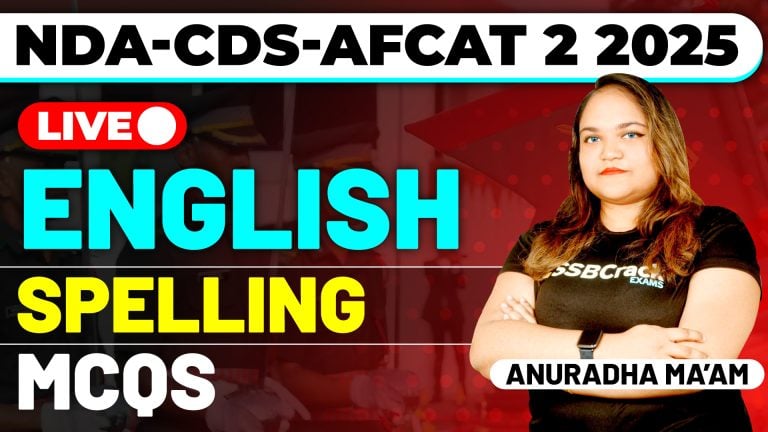
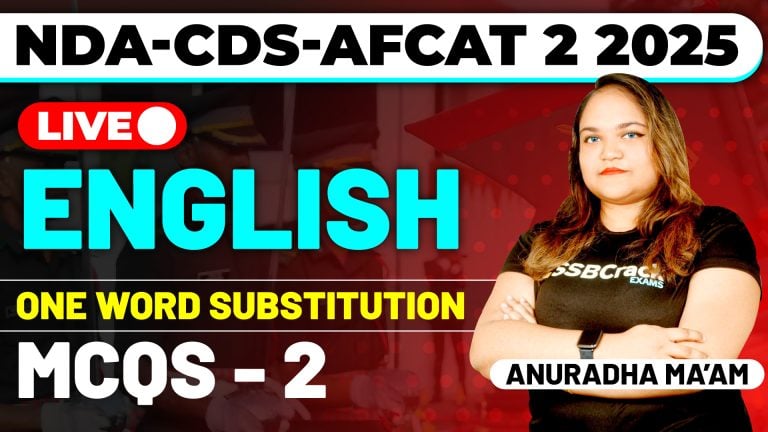
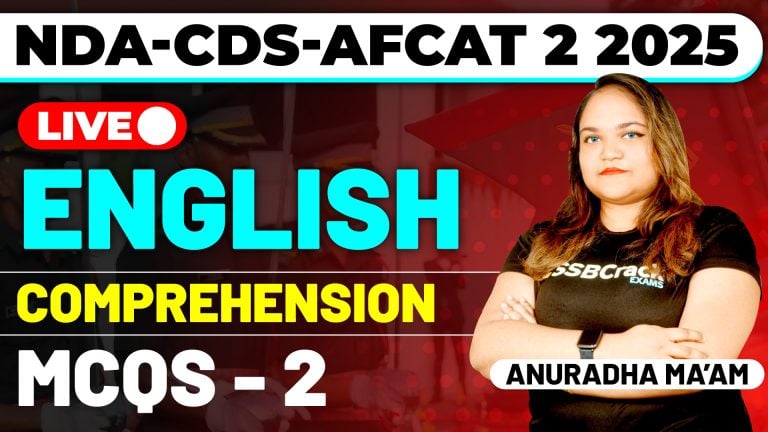
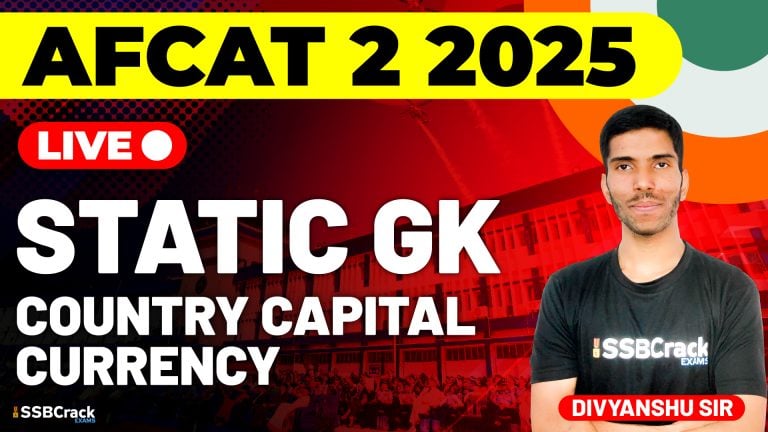
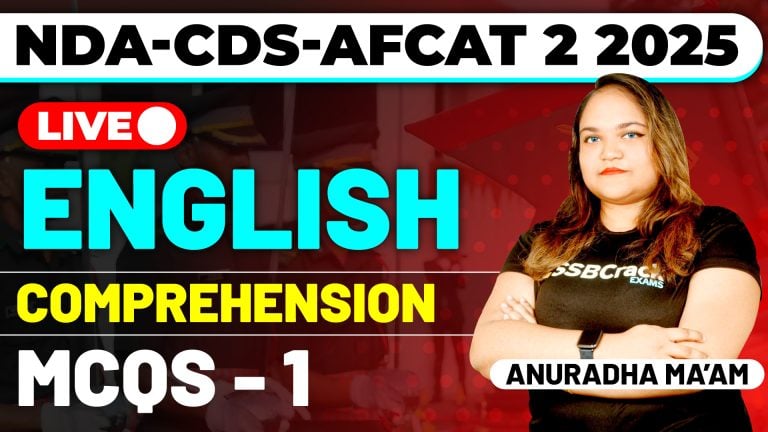
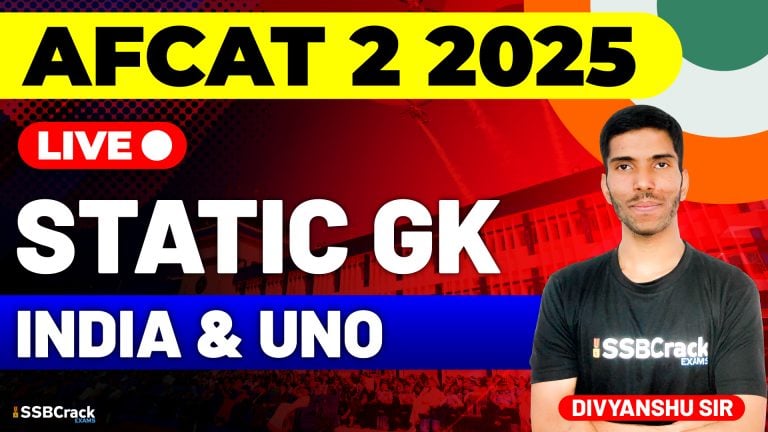



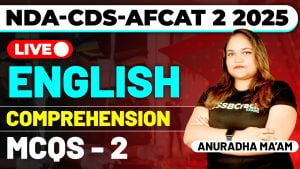


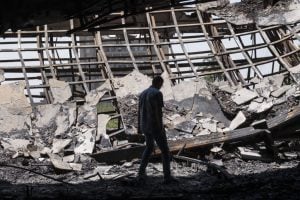




1 thought on “300 Most Expected Questions For AFCAT English Section”
Mam please provide for other sections too. Thank you